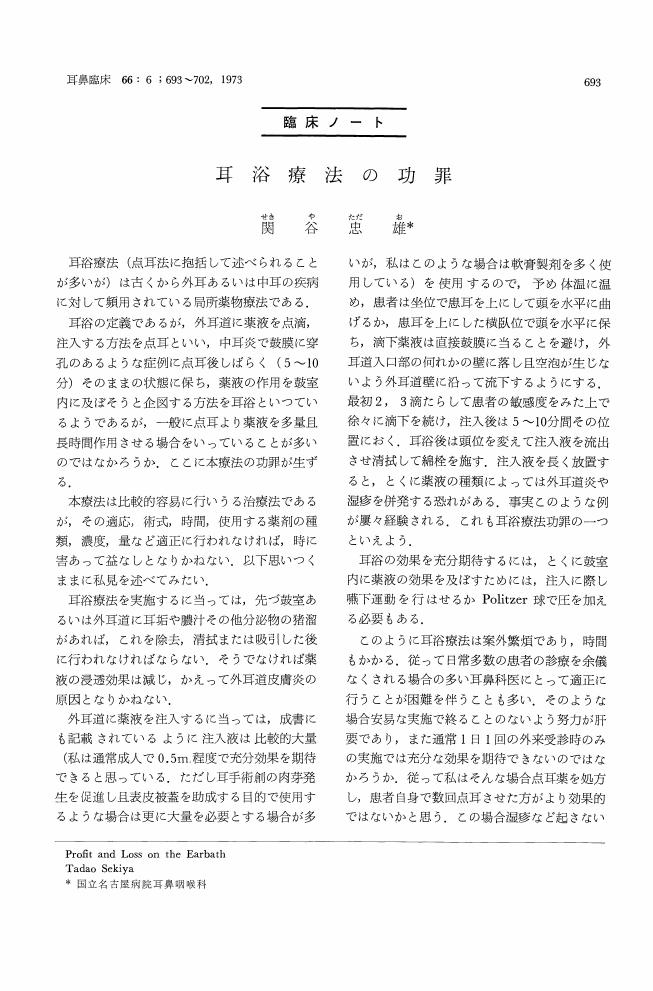1 0 0 0 OA 耳浴療法の功罪
- 著者
- 関谷 忠雄
- 出版者
- 耳鼻咽喉科臨床学会
- 雑誌
- 耳鼻咽喉科臨床 (ISSN:00326313)
- 巻号頁・発行日
- vol.66, no.6, pp.693-694, 1973 (Released:2011-11-04)
1 0 0 0 がん免疫療法に関する最近の話題
- 著者
- 近松 一朗 増山 敬祐
- 出版者
- 耳鼻咽喉科臨床学会
- 雑誌
- 耳鼻咽喉科臨床 (ISSN:00326313)
- 巻号頁・発行日
- vol.105, no.2, pp.87-94, 2012 (Released:2012-02-01)
- 参考文献数
- 32
- 被引用文献数
- 1
Cancer immunotherapy is designed to activate and up-regulate the host immune responses against tumor cells and is currently in use or under investigation for cancer treatments. Although tumor cells can use a variety of mechanisms to create an immunosuppressive environment, many agents and strategies to reduce or eliminate tumor-induced immune suppression are either being developed or already in clinical trials. This review deals with recent advances in cancer immunotherapy, focusing on new strategies to enhance antitumor immunity. Numerous approaches have been tested for the development of therapeutic cancer vaccines. Recently, several promising reports suggest that clinical benefit has been shown in randomized phase III trials for vaccines against prostate cancer, follicular lymphoma, and melanoma. Moreover, in 2010, the first patient-specific immunotherapy (sipuleucel-T) was approved by the FDA for the treatment of prostate cancer. On the other hand, some chemotherapeutic agents such as cyclophosphamide and docetaxel, have direct effects on the immune system that is likely to contribute to an improved antitumor immunity. Therefore, cancer immunotherapy combined with chemotherapy may represent one approach for breaking tumor-induced immune suppression. To date, a number of monoclonal antibodies are in use or under evaluation. Among these antibodies, blocking negative immunoregulatory receptors, CTLA-4 and PD-1, also represent a new strategy to induce antitumor immunity by manipulation of the immune system. In clinical trials, these antibodies could increase anti-tumor T-cell immunity and result in objective tumor regression in some patients. Thus, accumulating data from recent cancer vaccine trials, the manipulation of immune suppression using chemotherapeutic agents, and the use of immune-stimulatory antibodies raise the hope that immunotherapy could become the fourth modality of cancer treatment. Based on these new findings, in our hospital, a clinical trial using dendritic cells combined with low dose cyclophosphamide and docetaxel in patients with relapsed and refractory head and neck squamous cell carcinoma is under way (UMIN000003725, ClinicalTrials.gov identifier, NCT01149902). In the near future, various immunotherapeutic modalities will most probably be applied as novel approaches in the treatment of head and neck cancer.
1 0 0 0 OA 甲状腺分化型腺癌の統計
- 著者
- 深澤 達也 藤村 英一 加納 直行 牧本 一男
- 出版者
- 耳鼻咽喉科臨床学会
- 雑誌
- 耳鼻咽喉科臨床 (ISSN:00326313)
- 巻号頁・発行日
- vol.74, no.8, pp.1761-1766, 1981-08-01 (Released:2011-11-04)
- 参考文献数
- 6
Differentiated thyroid cancer is regarded to be of low grade malignancy with a good prognosis. We made statistical analyses of 138 cases of differentiated thyroid cancer treated in Kyoto University during the past ten years.Our study proved the propriety of the standard surgical procedures for thyroid cancer. These established indications of surgical procedure for various stages of the cancer were found to have been properly followed in our series. This could conceivably be related to a lower recurrence rate in our series.
1 0 0 0 エビデンスはいつも信用できるのか?
- 著者
- 山中 昇
- 出版者
- 耳鼻咽喉科臨床学会
- 雑誌
- 耳鼻咽喉科臨床 (ISSN:00326313)
- 巻号頁・発行日
- vol.105, no.5, pp.407-412, 2012 (Released:2012-04-27)
- 参考文献数
- 18
Currently, the evidence-based medicine, EBM, has become essential in every field of medicine and many clinical guidelines have been developed based on the high-quality evidence. Such evidence has usually classified into 6 levels according to the quality of the studies. A meta-analysis of randomized controlled trials is considered as the highest level of evidence. The meta-analysis, however, has several pit-falls that we should keep in mind. The pit-falls are Simpson’s paradox, the selection bias, the publication bias, and the geographical bias. In the clinical setting of otolaryngology, it is not always possible to obtain a high level of evidence for conventional clinical treatments such as myringotomy, sinus puncture and aspiration, aeration of the Eustachian tube for the treatment of otitis media with effusion, and so on. Since these treatment modalities have no high-level of evidence, should we therefore stop performing them? No. We should have a further look at these treatments as “good practice points (GPP)”. Otolaryngological specialists should play an important role in combining high-quality evidence and GPP to seek the optimum treatment approach for each patient.
